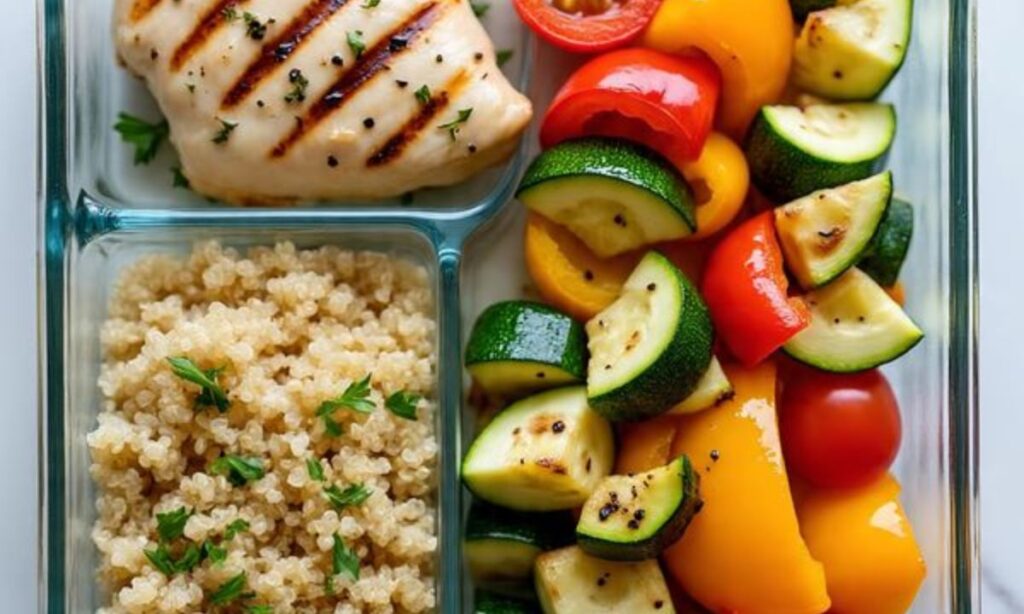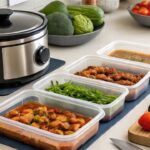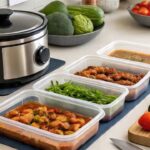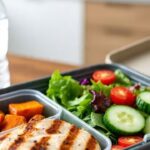Meal prepping is one of the most effective ways to save time, eat healthier, and reduce stress during the week. However, beginners often make mistakes that can lead to wasted time, food, and money. In this guide, we’ll cover the most common meal prep mistakes beginners should avoid, along with practical tips to improve your process.
Why Avoiding Meal Prep Mistakes Matters
- Saves Time: A streamlined meal prep prevents spending hours fixing errors.
- Reduces Waste: Proper planning minimizes unused or spoiled ingredients.
- Boosts Nutrition: Balanced prep ensures your meals remain healthy.
- Saves Money: Efficient shopping and preparation reduce unnecessary spending.
Common Meal Prep Mistakes and How to Avoid Them
| Mistake | Why It’s a Problem | How to Avoid It |
|---|---|---|
| Skipping a Plan | Leads to confusion and unbalanced meals. | Create a weekly menu and shopping list. |
| Overcomplicating Recipes | Increases time and frustration. | Start simple with 2–3 easy recipes per week. |
| Not Considering Storage | Causes food spoilage and waste. | Use airtight containers and label with dates. |
| Ignoring Portion Sizes | Results in overeating or not enough food. | Measure ingredients and use portion-control containers. |
| Cooking Too Much at Once | Can lead to burnout and wasted food. | Begin with smaller batches and scale up gradually. |
| Lack of Variety | Leads to boredom and temptation to order out. | Rotate proteins, grains, and vegetables weekly. |
| Poor Ingredient Choices | Unhealthy or highly perishable items reduce shelf life. | Select fresh, durable, and nutritious ingredients. |
Detailed Breakdown of Key Mistakes
1. Skipping the Planning Phase
Meal prepping without a plan can result in chaos. You may end up with mismatched ingredients or meals that don’t last the week.
Tip: Plan meals by category (breakfast, lunch, dinner, snacks) and make a shopping list.
2. Overcomplicating Recipes
Beginners often try gourmet recipes, which can be time-consuming and difficult.
Tip: Stick to recipes with under 10 ingredients until you’re confident.
3. Not Factoring Storage and Shelf Life
Improper storage leads to spoiled food and foodborne illnesses.
Tip: Use BPA-free containers, freeze meals that won’t be eaten within 3–4 days, and label them with preparation dates.
4. Ignoring Portion Control
Cooking large batches without considering portion sizes can lead to overeating or under-eating.
Tip: Invest in portion control containers or measure servings using a kitchen scale.
5. Lack of Variety
Eating the same food daily can cause burnout, making you less likely to stick with meal prepping.
Tip: Mix proteins, grains, vegetables, and spices weekly to keep meals interesting.
Pro Tips for Successful Meal Prep
- Batch Cook Smartly: Cook one or two staple ingredients (like rice or chicken) and mix them into multiple meals.
- Use Freezer-Friendly Meals: Freeze leftovers for busy weeks.
- Invest in Quality Containers: Choose microwave- and dishwasher-safe containers to make your life easier.
- Pre-Chop Ingredients: Save time during cooking by chopping veggies in advance.
- Stay Organized: Label meals with names and dates to avoid confusion.
Sample Meal Prep Plan for Beginners
| Day | Breakfast | Lunch | Dinner |
|---|---|---|---|
| Monday | Overnight oats with berries | Grilled chicken with quinoa | Stir-fried vegetables with tofu |
| Tuesday | Greek yogurt with honey | Turkey wrap with mixed greens | Salmon with roasted sweet potatoes |
| Wednesday | Smoothie with banana & spinach | Chicken salad | Beef stir-fry with brown rice |
Frequently Asked Questions (FAQs)
Q1. How long can meal-prepped food last in the fridge?
Most meal-prepped foods last 3–4 days in the refrigerator. For longer storage, freeze meals.
Q2. What are the best containers for meal prep?
Airtight, BPA-free, microwave- and dishwasher-safe containers are ideal. Glass containers are excellent for reheating.
Q3. How can I keep meals from becoming soggy?
Store dressings and sauces separately and assemble meals just before eating.
Q4. Can I meal prep snacks too?
Yes. Prep snacks like cut fruits, nuts, and yogurt parfaits to avoid unhealthy choices during the day.
Q5. Is freezing meals safe?
Absolutely. Freezing is a great way to extend shelf life, but ensure meals are cooled before freezing.
Key Takeaways
- Always plan ahead to avoid last-minute confusion.
- Start simple and gradually add complexity.
- Invest in storage solutions to keep meals fresh.
- Rotate your recipes to maintain interest and nutrition.
- Keep an eye on portion sizes to achieve health goals.
Final Thoughts
Meal prepping can be a game-changer for your health and schedule—if done right. By avoiding these beginner mistakes, you’ll save time, money, and stress while enjoying nutritious, delicious meals all week long. Start small, plan smart, and watch your meal prep routine transform your eating habits.





